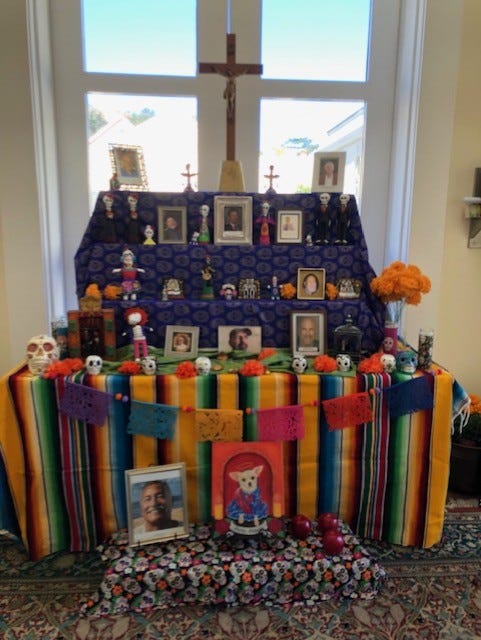This week my husband and I have decided to take the day after Halloween and build a family ofrenda with Joshua and Roma to teach them more about the celebration of Dia de los Muertos, Day of the Dead. It’s a part of Roma’s ethnic heritage and a lovely way to share more about our ancestors with our children. But there’s also a powerful communication lesson about using proper names for those we love, be they still with us or “on the other side.”

We both did some research into this. This piece from Maria Villa at Hallmark helped me get a deeper understanding of the ritual. What moved me most was the concept, frankly found in many traditions but kept alive with an ofrenda: we all die twice. Our first death is when we take our last breath, but our second death is when our name is last spoken. An ofrenda keeps that alive.
I love how the Pixar Film Coco presents this as the central quest that young Miguel takes to have his father’s name and image returned to the ofrenda.Where This Tradition Intersects Communication
This week’s newsletter is not simply a chance for me to bring you a short lesson on Dia de los Muertos, but to recognize the power of recalling and using names whenever we share stories.
When the person is still with us, it brings them to mind, and something within our presence shifts to make our communication more authentic. When a leader says, “Yesterday at home, my spouse reminded me…” it’s just not as resonant as, “Last night at dinner, Becky reminded me of how stressed I was at our last annual meeting.” Inserting just the first name of a patient, customer, or loved one makes the story more real for you and for the audience.
When the person has left us, it’s even more important for you and your audience to say their name and keep their memory and presence alive. Yes, you run the risk of choking up or tearing up. (See the Comm Matters edition for tips to Press On Through Tears when that occurs.) But more importantly, you keep that person in mind as you speak.
Speaking their name proves especially powerful if the person’s death was by their own hand. A few Saturdays ago, I was invited to offer brief remarks at the start of the Oakland Out of the Darkness Walk. We began the opening ceremonies just before dawn and then walked a little over three miles around Lake Merritt. As part of the ceremony, walkers were invited to say the names of those lost to suicide.
There’s a power in hearing and recalling, as I said in my talk, “not how they died, but how they lived.”
During the walk, I was able to spend time with many different people, but near the end, I settled in to walk with a family from Walnut Creek wearing custom shirts bearing great photos of their son, Gage, appearing on both the front and back. Each shot was a different offering of many views of Gage and his personality. While we talked together, they shared hilarious stories of how he loved to prank people. They even mused if he wasn’t actually behind the fact that the sprinklers in Snow Park came on during the end of our opening ceremony. It was the kind of trick that would have delighted Gage. It so made me wish I’d have known this young man.
So, my invitation to you this week is two-fold. First, practice sharing stories and see how they become more resonant when you use the names of those you are describing. And second, take time to tell at least one story about somebody you miss who is no longer with us. Keep their memory alive, for both yourself and others, in the retelling of their story. Let me know how it goes. I treasure your replies below, learning what resonates from what I write every few weeks.
I’ve been on the road a ton in October, and welcome to my newsletter hundreds of readers whom I met at Com Net in Kansas City, TED Next in Atlanta, and other workshops I’ve led or talks I’ve shared. I hope you enjoyed your first read, that you will check out the Comm Matters archives, and continue reading every few weeks.
JD’s Recommendations: what I’m reading, hearing, and seeing:
Reading: Adam Grant impressed me (yes, again!) with his advice: How to Acknowledge Your Weaknesses in a Job Interview. Share with those you know who are searching for a new job.
Hearing: I’ve shared a few episodes of Ryan Holiday’s Daily Dad podcast. A recent episode entitled, This Should Help, reminds us all of the value of taking back something that just came out wrong.
Seeing: At TED Next last week in Atlanta, I had the privilege of hearing Franziska Trautmann’s inspiring 5-minute talk: Your Empty Wine Bottle Could Help Rebuild Coastlines. Give it a view.
PS: This has been my 50th edition of Communication Matters since the start of last year. I’m thoroughly enjoying writing and sharing it with you and would love to know what you enjoyed the most about reading it. Leave a comment below (my favorite payoff), drop me an email or a note on LinkedIn. I’ve set the goal that the next fifty editions meet the needs of my loyal readers even better.







"... take time to tell at least one story about somebody you miss who is no longer with us. Keep their memory alive..."
50th edition of Communication Matters!👏👏Congrats!